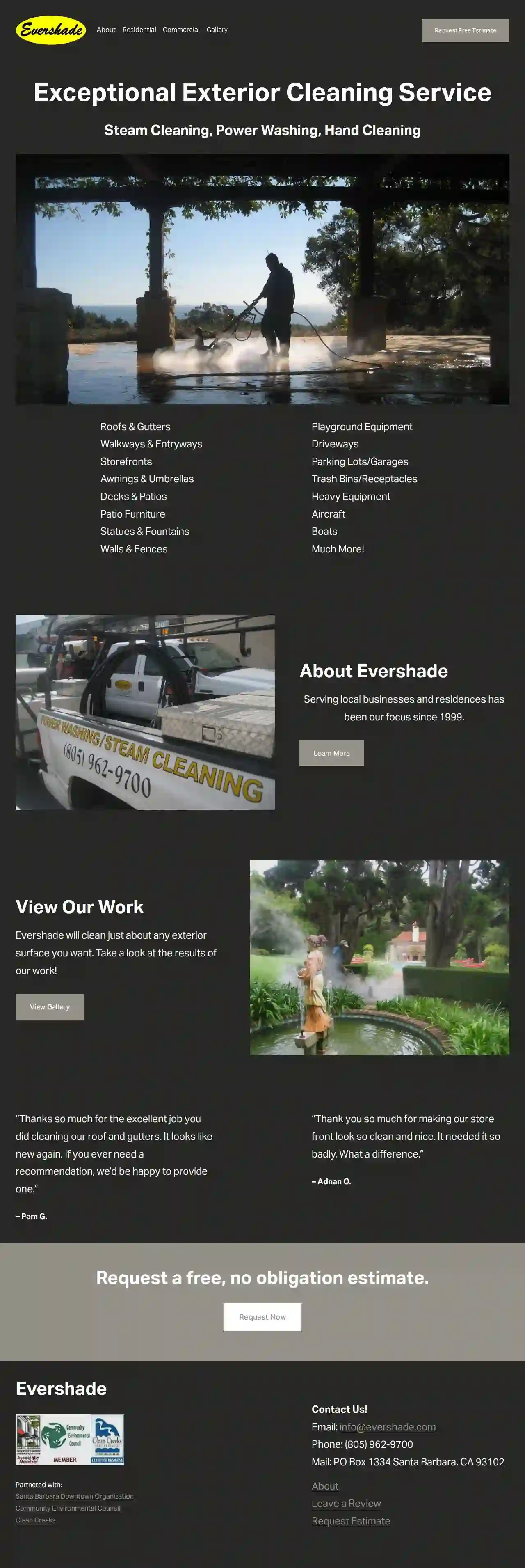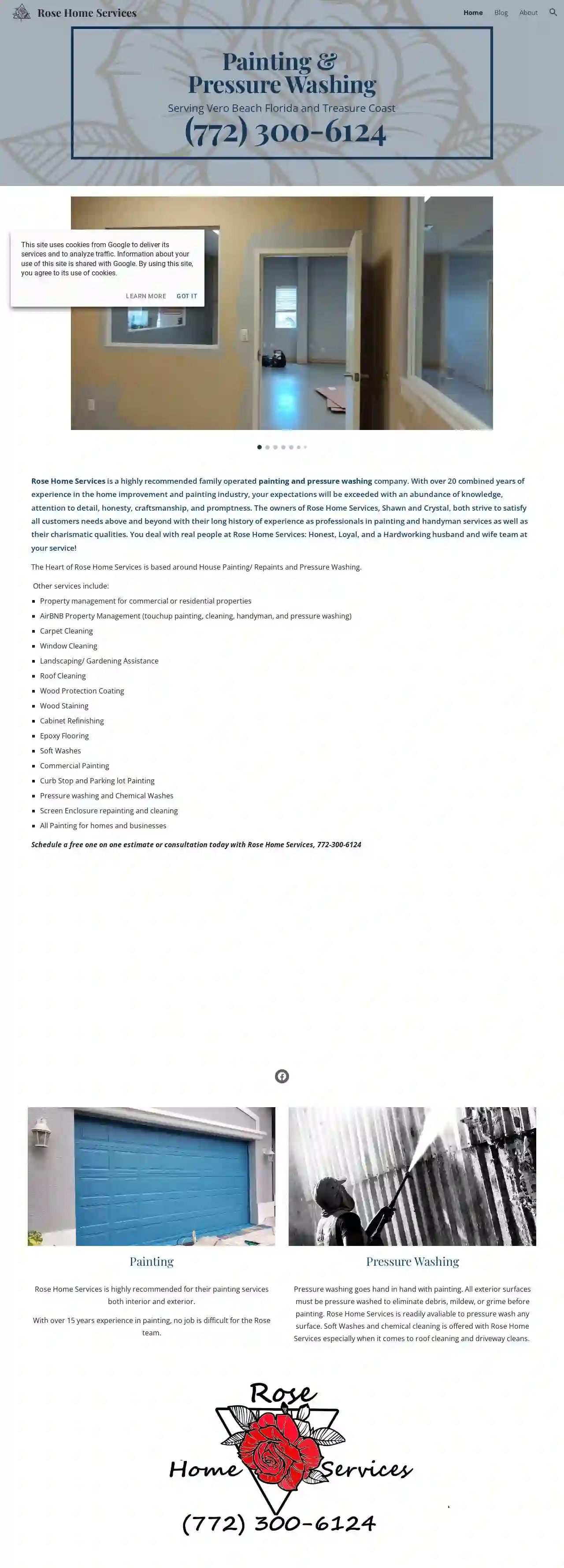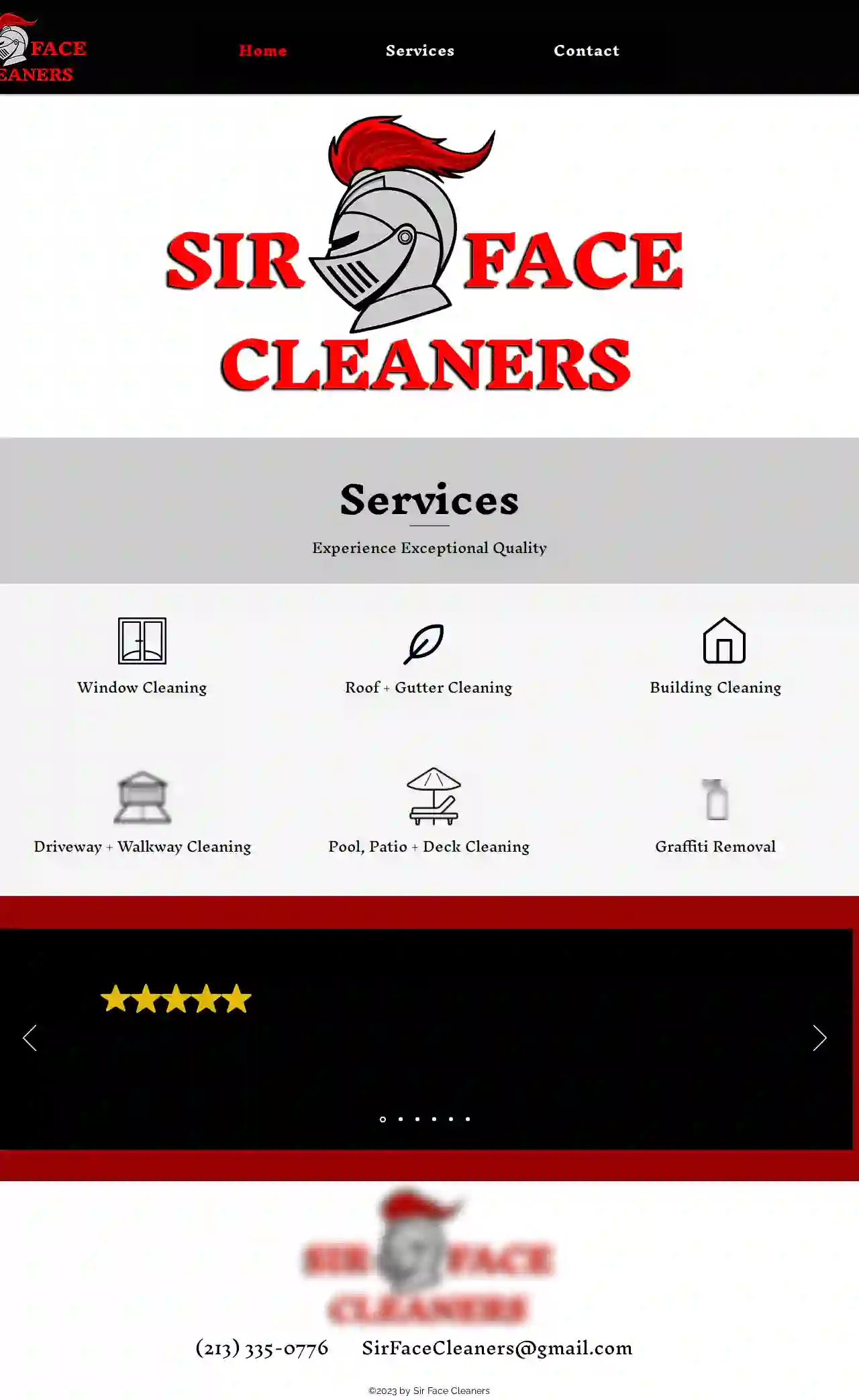Gutter Cleaning Westlake Village
Best Gutter Cleaning in Westlake Village
Receive multiple Roof Gutter Cleaning quotes for your project today! Compare profiles, reviews, accreditations, portfolio, etc... and choose the best service.

RayAccess, Inc.
4.991 reviews4246 Via Marina, Marina del Rey, 90292, USRayAccess is your reliable one-stop shop for high interior and exterior maintenance and cleaning. Our services include window washing, exterior and high interior building cleaning, painting, waterproofing, rain leak detection, and other exterior maintenance work. Our mission is to increase people's quality of life by keeping their buildings clean and healthy. Unlike other building maintenance contractors, RayAccess uniqueness lies in the versatile access expertise that allows us to service high areas. Our technicians are highly skilled, trained, and certified in using rope access, suspended platforms, lifts (compact, boom, scissor), fall-protection systems, ladders, rolling towers, and extension devices. Our special access expertise enables our team to complete work at hard-to-reach areas safely and efficiently. Learn more about RayAccess, Inc. In addition, RayAccess has full insurance coverage for any type of project. Thus, our typical coverage is $1,000,000 Workers Compensation, $2,000,000 General Liability, $5,000,000 Excess Liability, and $1,000,000 Commercial Auto coverage.
- Services
- Why Us?
- Accreditations
- Our Team
- Gallery
Get Quote
Evershade
55 reviewsSanta Barbara, USEvershade opened its doors back in 1999. Evershade started out as a small awning cleaning company with a hose and a bucket, focusing on hand cleaning of awnings, umbrellas, canopies & patio furniture. It was early on that we recognized the needs of our clients had expanded. With requests to clean items such as patios, roofs, gutters & exteriors, we purchased our first pressure washer. As they say, the rest is history. We now have an expansive fleet of trucks equipped with the latest waste water reclamation equipment, power washers & steam cleaners. Evershade is committed to the communities it serves. Established, owned and operated on the central coast of California. We are focused on providing, serving, and maintaining this beautiful area we call home. Evershade is based out of Santa Barbara, focusing on the residential needs in our area, and have also grown to become the premier power washing company for commercial properties within the tri-counties.
- Services
- Why Us?
- Accreditations
- Testimonials
- Gallery
Get Quote
AC's Exterior Cleaning Service
534 reviews544 Mayellen Ave, San Jose, 95126, USAC's Exterior Cleaning Service was founded back in 2002 by our owner Ben Corpuz. It all began with a trip to the doctor to find a solution to his children's illness and allergies. The doctor told Ben Corpuz that he needed to clean the windows and screens of his home to allow cleaner air to flow through. What started as a family solution to allergies turned into a growing business, offering homes the same solution. For twenty-two years we have provided San Jose and beyond with exceptional pressure washer services for residential and commercial properties alike. Our sole mission is to provide our clients with a premium solution that will increase their property value and give instant curb appeal. We stand out from other competitors because we treat each property like we would treat our own. We use top-of-the-line pressure washing equipment along with environmentally friendly cleaning supplies to get the best clean possible for each job that we take on. When you need a professional pressure washer to treat your San Jose home or business, give us a call. We have vast experience and knowledge to treat your property the right way the first time. Our pressure washer pros know all the best techniques and applications to get the best clean possible for your home or business.
- Services
- Why Us?
- Our Team
- Testimonials
- Gallery
Get Quote
Bobby's Gutter Cleaning and Repair
4.118 reviewsRoseville, 95678, USOver 22 years offering high-quality services in the Roseville, CA area. Welcome to Bobby’s Gutter Cleaning and Repair! We’ve been your trusted gutter cleaning company in the Roseville, CA area for over 22 years. Whether you need a new gutter system installed or a maintenance check-up, we’ve got you covered! Our team is qualified to offer solutions based on your property’s unique needs. We’re familiar with every type of gutter system and handle residential and commercial properties with unmatched craftsmanship.
- Services
- Why Us?
- Testimonials
- Gallery
Get Quote
HomeSmiles
4.941 reviews1526 Stafford Street, Redwood City, 94063, USHomeSmiles is a home maintenance and cleaning service provider that offers a range of services to keep your home well-maintained and looking its best. With over 190 5-star reviews, our customers love our service! We'll perform an extensive 18-point interior and exterior home maintenance ensuring all those "honey-do" items on your list are being taken care of. Your home is your most valuable investment, and our skilled, professional team will ensure it always looks its best and you avoid costly repairs down the road.
- Services
- Why Us?
- Testimonials
- Gallery
Get Quote
Gutter Cleaning By Fredy
53 reviewsLos Altos Hills, CA, 13977 Campo Vista Ln, 94022, USGutter Cleaning By Fredy is the most trusted gutter cleaning service provider in Los Altos Hills, CA! Our technicians are well-trained and equipped to ensure that you enjoy a seamless and professional experience. We are available to take care of all your exterior cleaning needs – not just your gutters. Read this page to learn what our technicians can do for you.
- Services
- Why Us?
- Testimonials
- Gallery
Get Quote
Rose Home Services
51 reviewsVero Beach, USRose Home Services is a highly recommended family operated painting and pressure washing company. With over 20 combined years of experience in the home improvement and painting industry, your expectations will be exceeded with an abundance of knowledge, attention to detail, honesty, craftsmanship, and promptness. The owners of Rose Home Services, Shawn and Crystal, both strive to satisfy all customers needs above and beyond with their long history of experience as professionals in painting and handyman services as well as their charismatic qualities. You deal with real people at Rose Home Services: Honest, Loyal, and a Hardworking husband and wife team at your service! The Heart of Rose Home Services is based around House Painting/ Repaints and Pressure Washing. Other services include: Property management for commercial or residential properties, AirBNB Property Management (touchup painting, cleaning, handyman, and pressure washing), Carpet Cleaning, Window Cleaning, Landscaping/ Gardening Assistance, Roof Cleaning, Wood Protection Coating, Wood Staining, Cabinet Refinishing, Epoxy Flooring, Soft Washes, Commercial Painting, Curb Stop and Parking lot Painting, Pressure washing and Chemical Washes, Screen Enclosure repainting and cleaning, All Painting for homes and businesses.
- Services
- Why Us?
- Our Team
- Gallery
Get Quote
Sudell Gutter Cleaning
4.986 reviewsLichfield, USWelcome to Sudell Gutter Cleaning, your local gutter cleaning and repair service. We are a hugely popular gutter maintenance company, known for our extremely high standard of work at surprisingly low prices, that beat many of our competitors. We are highly trained and fully equipped, and take pride in what we do. Due to high demand we continue to extend our Award Winning gutter services across the United Kingdom. Furthermore, our franchise teams are local, independently owned and operated.
- Services
- Why Us?
- Our Team
- Gallery
Get Quote
Sir Face Cleaners
59 reviewsLos Angeles, USAt Sir Face Cleaners, we pride ourselves on exceptional quality and professionalism. Our team of experts provides top-notch window cleaning, roof and gutter cleaning, building cleaning, driveway and walkway cleaning, pool, patio, and deck cleaning, and graffiti removal services. We take pride in our attention to detail and ability to clean those hard-to-reach places. Our goal is to provide exceptional service and leave your property looking its best.
- Services
- Why Us?
- Testimonials
- Gallery
Get Quote
Atlantis Exterior Cleaning
4.9241 reviews22 Tender Violet Place, The Woodlands, 77381, USTrusted Exterior Cleaning Professionals. Roof Washing, Window Cleaning, Gutter Cleaning & More. Get A Quote (832) 244-0830. We Guarantee A Job Done Right.
- Services
- Why Us?
- Testimonials
- Gallery
Get Quote
Over 60,241+ Janitorial Companies registered
Our cleaning services operate in Westlake Village and surroundings!
CleaningMatch has curated and vetted the Best Janitorial Businesses near Westlake Village. Find a top & trustworthy pro today.
Frequently Asked Questions About Gutter Cleaning
- Reduce Gutter Cleaning Frequency: Gutter guards significantly reduce the amount of debris that accumulates in your gutters, reducing the need for frequent cleaning.
- Prevent Clogs and Water Damage: By keeping gutters clear, gutter guards help prevent clogs that can lead to water damage.
- Reduce Pest Infestations: Gutter guards can deter pests like birds, squirrels, and insects from nesting in your gutters.
- Extend Gutter Lifespan: By preventing debris buildup, gutter guards protect your gutters from corrosion and damage, extending their lifespan.
- Foundation Problems: Clogged gutters can cause water to pool around your foundation, leading to cracks, leaks, and even structural damage.
- Basement Flooding: Overflowing gutters can lead to water seeping into your basement, causing flooding and damage to belongings.
- Roof Damage: Backed-up water in gutters can damage your roof, leading to leaks, rot, and costly repairs.
- Landscape Erosion: Water spilling over clogged gutters can erode your landscaping, damaging plants and creating unsightly trenches.
- Pest Infestations: Clogged gutters provide a breeding ground for mosquitoes, insects, and rodents, increasing the risk of infestations.
- Re-Securing Gutters: Tightening or replacing loose fasteners to secure sagging or misaligned gutters.
- Sealing Leaks: Applying sealant or replacing damaged sections to fix leaks at seams or cracks.
- Replacing Damaged Sections: Replacing damaged sections of gutters or downspouts with new matching pieces.
- Downspout Repair: Reattaching separated downspouts, replacing damaged sections, or installing extensions to direct water further away from the foundation.
- Gutter Guard Installation: Installing gutter guards to prevent debris buildup and reduce maintenance.
- Safety: Cleaning gutters involves working at heights, which can be dangerous. Ensure you have a stable ladder and someone to spot you.
- Equipment: You'll need a ladder, gloves, a bucket, a gutter scoop, and possibly a hose or pressure washer.
- Time and Effort: Gutter cleaning can be time-consuming and physically demanding, especially if you have a large house or multiple stories.
- Debris Disposal: You'll need to dispose of the collected debris properly.
What are gutter guards, and do I need them?
Benefits of Gutter Guards:
While gutter guards are an effective way to minimize gutter maintenance, they don't eliminate it entirely. Regular inspection and occasional cleaning are still recommended. If you're tired of frequent gutter cleaning or concerned about water damage, gutter guards are a worthwhile investment.
Why is gutter cleaning important?
Regular gutter cleaning prevents these problems and helps maintain the integrity and value of your property.
What are some common gutter repairs?
A professional gutter repair company can assess your gutters and recommend the most appropriate repairs to restore their functionality and prevent water damage.
Can I clean my own gutters?
DIY Gutter Cleaning Considerations:
If you're comfortable working at heights, have the necessary equipment, and are willing to invest the time and effort, DIY gutter cleaning is an option. However, for safety, convenience, and professional results, hiring a gutter cleaning service is often a better choice.
What are gutter guards, and do I need them?
Benefits of Gutter Guards:
- Reduce Gutter Cleaning Frequency: Gutter guards significantly reduce the amount of debris that accumulates in your gutters, reducing the need for frequent cleaning.
- Prevent Clogs and Water Damage: By keeping gutters clear, gutter guards help prevent clogs that can lead to water damage.
- Reduce Pest Infestations: Gutter guards can deter pests like birds, squirrels, and insects from nesting in your gutters.
- Extend Gutter Lifespan: By preventing debris buildup, gutter guards protect your gutters from corrosion and damage, extending their lifespan.
While gutter guards are an effective way to minimize gutter maintenance, they don't eliminate it entirely. Regular inspection and occasional cleaning are still recommended. If you're tired of frequent gutter cleaning or concerned about water damage, gutter guards are a worthwhile investment.
Why is gutter cleaning important?
- Foundation Problems: Clogged gutters can cause water to pool around your foundation, leading to cracks, leaks, and even structural damage.
- Basement Flooding: Overflowing gutters can lead to water seeping into your basement, causing flooding and damage to belongings.
- Roof Damage: Backed-up water in gutters can damage your roof, leading to leaks, rot, and costly repairs.
- Landscape Erosion: Water spilling over clogged gutters can erode your landscaping, damaging plants and creating unsightly trenches.
- Pest Infestations: Clogged gutters provide a breeding ground for mosquitoes, insects, and rodents, increasing the risk of infestations.
Regular gutter cleaning prevents these problems and helps maintain the integrity and value of your property.
What are some common gutter repairs?
- Re-Securing Gutters: Tightening or replacing loose fasteners to secure sagging or misaligned gutters.
- Sealing Leaks: Applying sealant or replacing damaged sections to fix leaks at seams or cracks.
- Replacing Damaged Sections: Replacing damaged sections of gutters or downspouts with new matching pieces.
- Downspout Repair: Reattaching separated downspouts, replacing damaged sections, or installing extensions to direct water further away from the foundation.
- Gutter Guard Installation: Installing gutter guards to prevent debris buildup and reduce maintenance.
A professional gutter repair company can assess your gutters and recommend the most appropriate repairs to restore their functionality and prevent water damage.
Can I clean my own gutters?
DIY Gutter Cleaning Considerations:
- Safety: Cleaning gutters involves working at heights, which can be dangerous. Ensure you have a stable ladder and someone to spot you.
- Equipment: You'll need a ladder, gloves, a bucket, a gutter scoop, and possibly a hose or pressure washer.
- Time and Effort: Gutter cleaning can be time-consuming and physically demanding, especially if you have a large house or multiple stories.
- Debris Disposal: You'll need to dispose of the collected debris properly.
If you're comfortable working at heights, have the necessary equipment, and are willing to invest the time and effort, DIY gutter cleaning is an option. However, for safety, convenience, and professional results, hiring a gutter cleaning service is often a better choice.